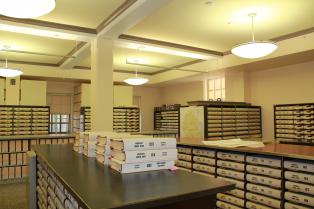Circuit Court Alert:


The resources listed below are not a complete record of the HRC’s holdings. This list is intended to serve as an introduction of the variety of records kept by the Circuit Court.
Original probate records (found in “Will Books”) are kept in the Historic Records Center from the years 1742 - 1935. Probate records are documents such as wills, inventories, estate and sale accounts, guardianship bonds and accounts, and executor and administrator bonds. The Will Books have been digitized and can be accessed on CPAN. The following page contains more information about wills in our collection. Indexes for probate records after 1935 can be found on CPAN or on the third floor of the Fairfax County Courthouse in the Land Records Division.
The Circuit Court maintains all land record filings from 1742, when Fairfax County was founded, to the present day. Original deed books (“Liber” books) from 1742 through 1942 can be found in the Historic Records Center. Deed books are arranged chronologically by the date of recordation. Early deed books include Commissions and Bonds from Governor of Virginia, deeds, trusts, bills of sale, manumissions, and lists of prisoners housed in the jail. The following page contains more about deeds in our collection. Indexes for deed books after 1866 can be found on CPAN or on the third floor of the Fairfax County Courthouse in the Land Records Division.
Please note: Some deed books are missing from our collection. In the #1 series: books F, H, J, N and V; in the #2 series, books C, D, F, H, I, K, N, Q, and T.
The Fairfax Circuit Court Historic Records Center holds Land (Real Estate) Tax Books from 1851 to 1980, and Personal Property Tax Books from 1851 to 1939. Historic land tax records included information such as name of owner, total acreage, distance and direction from the county courthouse, value of land per acre (with and without buildings), and total assessed taxes.
Land tax lists from 1782 to 1927 are available on microfilm at the Library of Virginia in Richmond.
Learn more about land taxation in the Commonwealth of Virginia from the Library of Virginia’s Research Notes Number 1: Using Land Tax Records in the Archives.
Please note: Our tax books between 1851 and 1920 are incomplete and in very fragile condition. Due to their size and condition, no copies will be made from original tax books. Because our tax books are kept in a separate location from the Historic Records Center, we can only pull three books at a time.
The Historic Records Center holds birth and death records from 1853 to 1896, and from 1912 to 1917. No birth or death records exist prior to 1853, and no law existed in the Commonwealth of Virginia for recording births and deaths between 1897 and 1911. Go to the following page to read more about or birth and death record holdings.
The Historic Records Center holds marriage records from 1853 to 1957. You can view the Marriages index at the linked webpage.
Chancery is a form of litigation seeking equity. These files contain original papers of litigation and usually pertain to divorce and real property; boundary disputes; estate divisions (land and slaves); and sales of property (auctions) for the satisfaction of debts. The HRC holds Chancery cases from 1805 to 1937. Please go to this webpage to view our chancery index.
Please note: Chancery cases from 1805 – 1865 are largely incomplete due to damage sustained during the Civil War. Chancery cases from 1742 – 1805 have been entirely lost due to the Civil War.
Actions undertaken in court were recorded in Court Order (Minute) books. The Historic Records Center maintains order books from 1749 to the early 1900s. Information contained in these books include general court business but also the appointment of public officials; orphans and other public welfare needs; apprenticeships; civil cases (such as debts); criminal cases (theft, arson, murder, etc.); road, railroad, mill, and bridge petitions; manumissions; tavern and liquor license petitions; and administration of estates.
Order Books from 1749 – 1870 have been abstracted by surname and subject and are searchable in the index card catalog available in the HRC.
Please note: Several order books are missing. These include 1742-1748, 1775-1782, 1793-1796, 1798, 1804-1806, 1810-1812, and 1818.
Judgments was a general term for loose court papers used by clerks to describe legal records generated by the court during a specific court session (month/year). Judgments can include civil suits, criminal papers, Free Negro certificates or registrations, road petitions, land commissioner’s reports, coroner’s inquests, grand jury lists, officials’ bonds, tax records, and administrators’ bonds. The bundled records were filed chronologically by the month and year and generally match entries recorded in an order book. Click here to view the Term Papers index.
Please note: Term papers (Judgments) from 1742 – 1840 are largely incomplete due to the losses sustained during military occupation during the Civil War. The documents that did survive the Civil War can be found in the “Drawer X” files [link to 4.7].
Pursuant to an Act of the General Assembly in 1793, free African Americans (either born free or emancipated) were required by law to register with their local county Clerk of Court. The Fairfax Circuit Court Historic Records Center holds two volumes of the Registration of Free Negroes, for the years 1822-1861. The first volume, ca. 1793 – 1821, is unfortunately missing. The register gives the registrant’s name, physical description, and how they became free, either through birth or by emancipation. You can go to this website to view the index to the Registration of Free Negroes and learn about other court records pertaining to slavery and free blacks.
